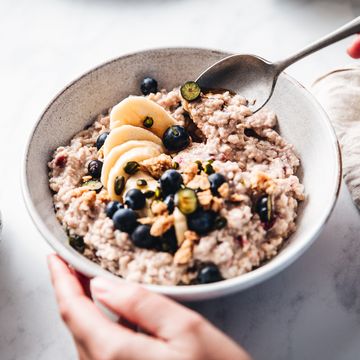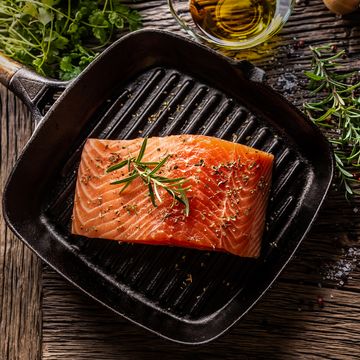Believe it or not, there is quite a bit of science behind stress eating. Stress and weight gain have been studied for many years, especially the link between stress and the obesity epidemic. According to this Global Emotions Report from Gallup, stress levels for Americans are significantly higher than the global average. And with updated government reports showing that more than 40% of people in the United States are obese, there very well could be a connection between this and our stress levels.
What is stress eating?
Stress eating, often synonymous with emotional eating, is the act of eating food in response to feelings. This typically occurs when you may not even be truly hungry, but some sort of emotion triggers you to eat more. When we feel stressed (be it physical or psychological), our body releases a steroid hormone known as cortisol. This hormone has several roles in the body, including helping to control blood sugar levels and regulate metabolism. A short-term activation of your stress system is fine and can actually suppress your appetite. But chronic stress (think financial issues, constant bickering with a spouse or friend, or work pressure) can lead to high levels of cortisol that stay elevated, which subsequently increases blood sugar and appetite. This in turn can make you crave sugary foods or even fatty/greasy foods, which both tend to be very high calorically and can lead to excess weight gain, as well as a negative relationship with food.
What are some of the causes of emotional eating?
- Boredom: We all have different definitions of boredom, but it usually focuses around having nothing to do or the task we are doing just seems pointless. This can leave us searching for something to pass the time by, enticing us to eat and potentially leading to emotional eating.
- Old habits: Maybe your work colleagues would order fast food for the office for lunch every day, and even though you're in a new job now, you still find yourself ordering fast food several times a day. I always say that habits are learned, which means they can be unlearned and replaced with a new, healthier habit.
- Finances, work stress, and social interactions: Too much or too little social interaction can influence our cravings. If you're pent up with your spouse or roommates, and they tend to eat a lot of junk food, you may be tempted to do so as well. Maybe after a big blowout fight you feel the need to eat lots of sugar, or perhaps you just feel lonely and a warm cookie feels like a big hug at the end of the stressful work day. This is all fine if you truly listen to your body, honor your cravings, and feel in control. But if stress seems to be leading your emotions to get the best of you and resulting in poor food choices over and over again, it may be time to make a change. Food is food; it's not your best friend and it's not your worst enemy. If you're looking to food to solve your problems, you'll quickly realize it won't.
How do I know if my cravings are from emotional stress?
I like to look at cravings by whether they are coming from above the neck or below the neck. Above the neck cravings are emotional, often come on suddenly and aren't satisfied even after a full meal. If you give in to above the neck cravings, they may sometimes trigger feelings of shame and guilt, and you may feel like you have absolutely no control over your food choices.
Below the neck cravings are not emotional, but rather a sign of physical hunger. It builds gradually and many food options sound appealing. Once you're sensibly full, the cravings go away. Below the neck cravings aren't associated with any feelings of guilt or anger, but rather you feel satisfied and maybe relieved after eating that particular food or meal.
Sometimes, these cravings may be hard to distinguish between. Has overeating sugary foods at night become a habit or does your body really crave them? Have you been training your body by giving in to those above the neck cravings every night to expect a surge of sugary foods, only to create almost a dependency and need for the food at a certain time of the day? Think back to when this habit started and try to practice mindful eating to be more in tune with your body and its true physical hunger needs.
Ways to Stop Stress Eating
The key to getting rid of emotional eating is to slow down, identify what's causing the craving, and make gradual changes. Try to keep those "temptation foods" in the back of the pantry where you can see them, and bring the healthy items front and center. You know your body and mind better than anyone else, so maybe that "out of sight, out of mind" mentality works best for you and keeping junk food out of the house is best. Make sure to eat three balanced meals daily and avoid skipping meals, as this can lead to overeating later on in the day. When it comes to any habit, it's hard to quit something cold turkey and not replace it with another action. Find something else to do that's more productive and can foster the creation of new healthy habits, like:
- Going for a walk
- Having a warm cup of tea
- Reading a book
- Watching a comedy show
- Journaling daily
- Snuggling with your pet
- Playing music and dancing
- Crafting, coloring, drawing, or painting
- Brushing your teeth
- Chewing a piece of gum
- Drinking a tall glass of water or naturally flavored seltzer
- Going to sleep (a lot of emotional eating happens at night when we really should be getting ready for bed!)
- Practicing relaxation techniques like meditating, stretching, yoga, or taking a bath
Stefani (she/her) is a registered dietitian, a NASM-certified personal trainer and the director of the Good Housekeeping Institute Nutrition Lab, where she handles all nutrition-related content, testing and evaluation. She holds a bachelor’s degree in nutritional sciences from Pennsylvania State University and a master’s degree in clinical nutrition from NYU. She is also Good Housekeeping’s on-staff fitness and exercise expert. Stefani is dedicated to providing readers with evidence-based content to encourage informed food choices and healthy living. She is an avid CrossFitter and a passionate home cook who loves spending time with her big fit Greek family.














